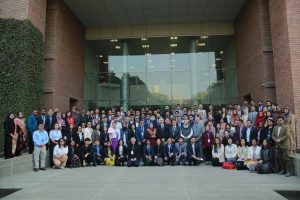LAHORE, Nov 29 (APP): The Asian Productivity Organization’s international conference on Green Productivity 2.0 (GP 2.0), jointly organized by the LUMS Energy Institute (LEI), the National Productivity Organisation Pakistan (NPO), Federal Ministry of Industries & Production, on Saturday concluded successfully at the Lahore University of Management Sciences (LUMS).
The two-day event brought together senior government officials, industry leaders, international experts, academics, and development practitioners from 21 Asian Productivity Organization (APO) member economies, with more than 80 foreign delegates participating, marking one of Pakistan’s most prominent international forums on sustainable industrial transformation, said a press release.
The conference featured high-level plenaries, expert keynotes, and sector-focused discussions aligned with the advanced GP 2.0 framework. Sessions addressed a wide range of themes, including sustainable architecture and industrial growth, energy efficiency, circular-economy innovation, energy transition, digital productivity tools, green hydrogen applications, green initiatives in the power and oil and gas sectors, efficient thin-film photovoltaics, circular plastics solutions, and collaborations across government, academia, and industry.
Presentations from experts representing Italy, Japan, Thailand, China, Malaysia, Sri Lanka, Türkiye, Vietnam, Pakistan and other APO economies showcased cutting-edge research and applied solutions shaping the future of green productivity across the region.
Federal Minister for Planning, Development & Special Initiatives, Ahsan Iqbal Chaudhary, emphasised, “Green productivity is not just an environmental choice; it is an economic necessity for countries like Pakistan.” He stated that by 2035, Pakistan aims to achieve over 6% productivity-driven GDP growth, $100 billion in exports, a 30% reduction in emissions intensity, universal climate-resilient infrastructure, 60% clean energy, 2 million green and high-tech jobs, and full integration into Asian green supply chains.
Minister for Climate Change and Environmental Coordination, Dr Musadiq Malik, highlighted the alignment between climate policy and productivity-led growth. He noted, “Pakistan’s energy future depends on cleaner, smarter, and more efficient systems. Green productivity provides the pathway to strengthen energy security and national resilience.” He also said that Pakistan’s 17 percent voluntary NDC commitment reflects our responsibility to safeguard the future of our children. “The global shift from multilateralism toward bilateral arrangements has led to a steady decline in multilateral climate financing. This contraction poses significant challenges for countries like Pakistan striving to build a fast-growing green economy,” he added.
Representing parliamentary leadership, Shaista Pervaiz Malik, MNA and Convener of the Parliamentary Taskforce on SDGs, underscored the SDG-aligned development priorities and stated, “Green productivity ensures that economic growth advances alongside environmental responsibility and social well-being. This balance is essential for a sustainable Pakistan.”
The APO Secretariat’s perspective was presented by Zainuri Juri, who commended Pakistan’s leadership on the GP agenda, noting, “Pakistan, a steadfast partner of the APO, has demonstrated a strong commitment to advancing Green Productivity, which is exemplary across the member economies.”
Reflecting on the conference outcomes, Dr. Fiaz Chaudhry, Senior Advisor, LUMS Energy Institute, and Alamgir Chaudhry, CEO, NPO, highlighted the importance of collaboration in accelerating sustainable transformation. Dr Fiaz stated, “This conference has shown the power of partnership between government, academia, and industry in shaping Pakistan’s sustainable industrial future.”
Dr Tariq Jadoon, Provost LUMS, appreciated the active participation from international and national delegates, adding, “The insights shared over these two days will meaningfully support Pakistan’s transition toward cleaner, more competitive, and productivity-driven industrial growth.”
The international conference on Green Productivity 2.0 concluded with a strengthened regional commitment to advance sustainable industrial development, deepen cross-sector collaborations, and support Pakistan’s transition toward a low-carbon, innovation-driven, and globally competitive industrial economy.











